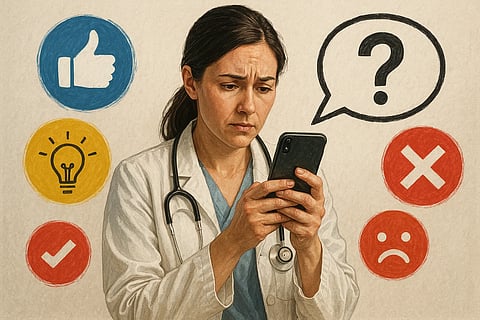
- Home
- न्यूजग्राम
- NewsGram USA
- India
- World
- Politics
- Entertainment
- Culture
- Lifestyle
- Economy
- Sports
- Sp. Coverage
- Misc.
- NewsGram Exclusive
- Jobs / Internships

Doctors hold one of the most vital roles in society—healers who not only save lives but also guide individuals toward healthier living. With the rise of social media, many doctors have embraced these platforms to educate the public, raise health awareness, and promote preventive care. However, the growing presence of self-proclaimed experts and fake medical influencers has also raised serious concerns about misinformation.
A recent discussion on MedBound HUB- a COMMUNITY FORUM dedicated to medical students and healthcare professionals- titled "Do Doctors on Social Media Help Educate or Mislead Society?" sparked a wave of insightful debates, highlighting both the benefits and the potential dangers of medical content online. The discussion reflected a divided opinion—while social media can be a powerful tool for public health education, it also opens the door to misinformation. The debate highlights the urgent need for digital accountability, fact-checking, and platform-based verification to ensure that the advice people follow is medically sound. Here's what the public and professionals had to say.
The conversation reflected a mix of skepticism, concern, and cautious support. Many participants observed that while doctors increasingly create reels, shorts, and health-related videos on social media, not all content seems relevant or trustworthy.
We daily see the doctors on Instagram ,YouTube like platform making reels ,shorts and videos but we can also see that some of them ae so irrelevant, what you think??
Aastha Bobade, a 3rd-year BAMS student
This sparked agreement from others who echoed similar concerns about the quality and intent behind such content.
Yes, blindly trusting to such platforms is not a great choice, I guess.
Wakeeta Sharma, Biotechnology post-graduate student
However, not everyone was dismissive. Some defended the presence of doctors online, noting that even if certain posts seem irrelevant, the individuals might simply be sharing their views.
Yes some might be irrelevant but they are sharing their views. But hope they’re certified doctors.
G.Lakshmi Barathi, BDS
This highlighted the importance of verifying credentials before accepting advice from social media.
In the discussion at MedBound HUB, medical students unanimously agreed on the point of blindly trusting information on such platforms is unwise.
As one student rightly pointed out:
Social media is a powerful tool. When used responsibly, doctors can become educators at scale. But unchecked, it can become a source of mass confusion.
Vishal Kumar, Student of Pharmacy
This thoughtful insight was well-received, leading to a consensus that viewers should critically evaluate content and avoid falling for false claims.
Adding a this, Aastha Bobade, a 3rd-year Bachelor of Ayurvedic Medicine and Surgery (BAMS) student, shared her experience:
I actually watched a reel where an influencer was just mixing all the edible material like dahi, besan and coffee and she just called that an Ayurvedic face pack and it was used by our kings and queens like whatttt??? Bro coffee is never mentioned in Ayurveda!!!
Physiotherapy student Harshita Suthar pointed out:
“In my opinion, the side of educating the people is more dominant than the misleading. It really helps the society to get professional guidance through their content. THOUGH, every advice should always be followed by consulting the healthcare professionals only. But as we all know, where there are pros, there will be cons as well. Just a mistake can be very dangerous too.”
Some participants also acknowledged the dual nature of such online medical content:
“Some are good for making awareness about medicine, food intake, etc. Some promote unnecessary things, which may not be good for your health, but they will get a good outcome.”
Adwaitha, 3rd year MEDICO
Another serious issue raised was the ethical responsibility of medical influencers. A student sharply criticized the commercial motivations of some content creators, stating:
"The influencers forget their work ethics sometimes and become a face to sell some company’s products without even knowing it’s actual pros and cons"
Sakshi Bhaladhare, a final-year B.Pharm student
Throughout the conversation, students emphasized the need for viewers to verify whether the doctors they follow are certified professionals. There was general agreement that while many doctors do contribute meaningful content, there are definitely some who mislead audiences, intentionally or otherwise.
There are certain profiles of doctors who explain topics in great details and give you a glimpse of the clinics from their perspective. I believe its great to have such profiles and promote credible medical info.
Medha, BDS student
Another medical student added:
“Yes, very few social media healthcare content creators are from the medical background [but they] help the society—those people who are not connected to mainstream healthcare centers. Through social media they are trying to reach the sole person in remote [areas] to inform them about disease and their health.”
Vinayak, a third-year B. Pharmacy student
Sneha, medical student, offered a concluding insight:
“It actually depends on the individual doctor. Some are genuine and some are influencing people wrongly. Many doctors on social media are doing a great job educating the public and students. Before following all this information, also check out other sources as they deal with one’s health and life. So don’t get easily influenced by social media.”
In conclusion, social media is filled with both good and bad advice. It is up to individuals and the medical fraternity to keep a check on online content. People should also take advice with a pinch of salt to protect themselves from misinformation and pseudoscience.
To take part in such insightful discussions, join MedBound HUB—India’s most reliable COMMUNITY FORUM for medical students and healthcare professionals.
Sign up here: https://www.medboundhub.com/
[Rh/VA]
